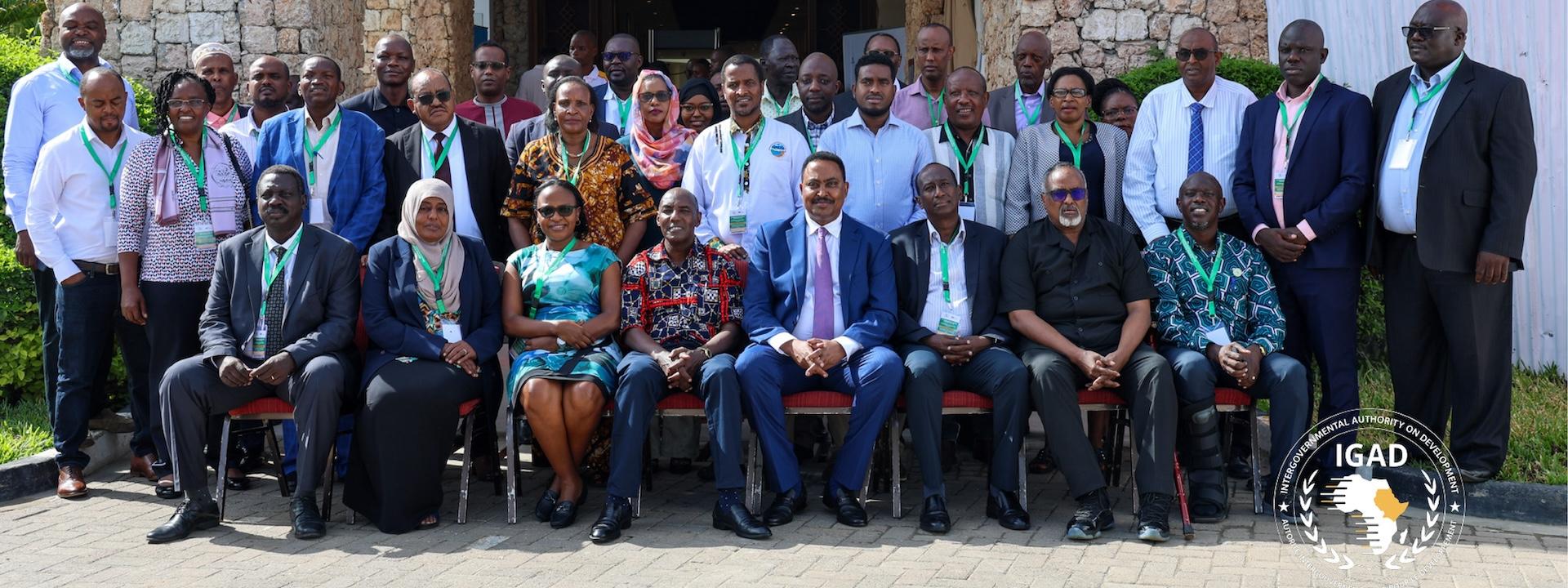June 6, 2024 (Mombasa, Kenya): The 17th IDDRSI Platform Steering Committee held a two-day meeting, significantly enhancing resilience in the IGAD region’s arid and semi-arid lands (ASALs). Building on insights from the 16th meeting in Entebbe, Uganda, the committee addressed the next phase of collective efforts.
The 17th IDDRSI Platform Steering Committee was officiated by H.E. Dr. Workneh Gebeyehu, the IGAD Executive Secretary, and Hon. Kello Harsama, Principal Secretary of the State Department of ASALs, EAC, and Regional Development of the Republic of Kenya, and Chair of the IDDRSI Platform Steering Committee. H.E. Mr. Mohamed Abdi Ware, the Deputy Executive Secretary of IGAD, presided over the two-day meeting.
Speaking at the opening session, the Executive Secretary, H.E. Dr. Workneh Gebeyehu, emphasised the initiative’s critical role in addressing climate change and natural disasters. He stated, “Since 2011, IDDRSI has mobilised substantial resources, with over 90% allocated to member-state projects, primarily in the arid and semi-arid lands. This achievement demonstrates our collective commitment to tackling climate change and natural disasters. As we gather here today, we are presented with a unique opportunity to further our efforts in building and enhancing resilience, ensuring sustainable development, and securing a prosperous future for our region. Let us continue to work together with renewed vigour and determination to achieve our shared goals.”
Hon. Kello Harsama, Principal Secretary of the State Department of ASALs, EAC, and Regional Development of the Republic of Kenya, noted in his remarks, “The weather extremes we have experienced in the region in the recent past show that climate change is here with us and we must, as a region, do something to both mitigate and adapt to climate change. It is a clear pointer that we have to continuously review our strategies with the aim of building on good practices and even completely changing approaches or strategies.”
The gathering united key stakeholders from IGAD member states, development partners, and experts to review progress and strategise on enhancing resilience against drought and other climatic shocks in the region.
The arid and semi-arid lands, covering 70% of the IGAD region’s total landmass (5.2 million square kilometres), face numerous challenges, such as recurrent droughts, floods, desert locust invasions, conflicts, poor infrastructure, and market shocks. These adversities significantly impact food security and economic stability among ASAL communities.
The IGAD Drought Disaster Resilience and Sustainability Initiative (IDDRSI) was launched in 2011 in response to these challenges. The platform’s core functions include policy development guidance, resource mobilisation, capacity building, knowledge management, and promoting evidence-based, participatory approaches to resilience-building. The 15-year strategy, spanning from 2013 to 2027, aims to bolster the resilience of ASAL communities through a multi-sectoral approach. Phase 2 of this strategy, running from September 2019 to August 2024, is nearing its completion.
Mid-Term Review (MTR) of IDDRSI Phase 2
The MTR of IDDRSI Phase 2 was nearing its conclusion and was addressed during the 17th IDDRSI Platform Steering Committee meeting. The review assessed the implementation of the second phase of the IDDRSI Strategy (2019-2024), evaluated progress, identified successful practices and areas for improvement, and addressed emerging challenges in the Horn of Africa.
The MTR followed OECD-DAC standards and included evaluations of relevance, coherence, effectiveness, efficiency, sustainability, impact, and gender considerations. A participatory approach was adopted, involving desk reviews of IDDRSI documents and stakeholder interviews to ensure comprehensive insights and actionable recommendations.
Objectives of the 17th IDDRSI Platform Steering Committee Meeting
- Review Progress: The meeting evaluated the progress of resilience projects, including flagship initiatives like the Project to Build Resilience for Food and Nutrition Security in the Horn of Africa (BREFONS), the Food System Project, and the Strengthening the Coordination and Implementation of IDDRSI (SCII) Project.
- Assessed Challenges: The meeting assessed the MTR Report of IDDRSI Phase 2, focusing on challenges faced by ASAL communities, such as climate change impacts, conflict, and displacement, and explored strategies to address these issues effectively.
- Discuss Funding: The meeting explored sources of resilience investment to finance the third phase of IDDRSI and beyond.
The IGAD Secretariat, through the Planning, Coordination, and Partnership Division/IDDRSI Platform Coordination Unit, presented a report on the progress of implementing regional projects and recommendations from previous meetings. Updates from IGAD Member States and Development Partners were also discussed.
Conclusion
The 17th IDDRSI Platform Steering Committee Meeting represented a significant step in the ongoing efforts to build resilience and promote sustainable development in the IGAD region. The recommendations and insights gained from this meeting would guide future actions and investments, ensuring a resilient and prosperous future for ASAL communities.

